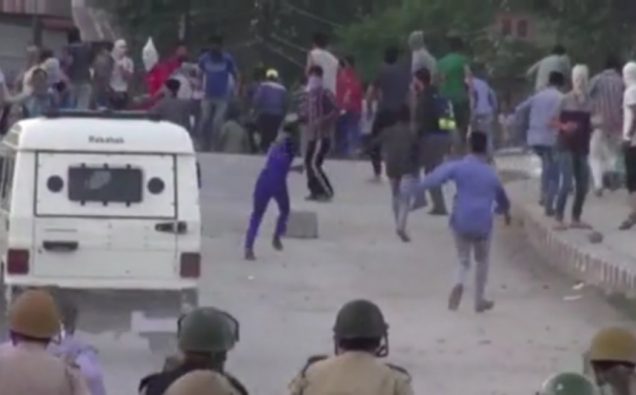
Pakistan’s ambassador in Washington Jalil Abbas Jilani has handed overr a dossier to the United States on Indian human rights violations in Kashmir, as the State Department said America is continuing efforts to reduce South Asian tensions.
Washington also urged “calm and restraint on both sides,” as tensions over Kashmir continued to cast a shadow over the region.
Pakistani Prime Minister’s Special Envoys Senator Mushahid Hussain Syed and Memberr National Assembly, Dr. Shazra Mansab also met with US Special Envoy for Pakistan and Afghanistan Richard Olson and shared a “carefully documented evidence of Indian brutalities and the systematic human rights violations being perpetrated by the Indian forces against the innocent civilians,” the Pakistani embassy said.
The two envoys said the Indian controlled Kashmir was the most heavily militarized zone on earth.
The United States, meanwhile, has said it is communicating with leadership in both Islamabad and New Delhi to help reduce South Asian tensions.
A Pakistani embassy statement said Ambassador Jilani Monday met with Ambassador Richard Olson at the State Department and handed over a dossier containing information on gross human rights violations committed by the Indian security forces in Kashmir.
Jilani emphasized that the international community, especially the United States, “should take note of the inhuman and degrading treatment being meted out to the innocent civilians including the women, children, elderly and patients, in the occupied Kashmir.”
“The US, being a permanent member of the United Nations Security Council, should impress upon India to immediately end the state sponsored terrorism against innocent civilians who have been indiscriminately targeted by Indian forces,” Ambassador argued, according to the statement.
Ambassador Jilani also stressed that the right to self-determination was granted to the people of Kashmir by the United Nations which could not be unilaterally denied by India.
“Ambassador Jilani further underscored that the international community must ensure that India as a member of the United Nations, should allow access to international human rights and humanitarian organizations to assess the factual situation in the IoK (Indian Occupied Kashmir).
The statement said the Pakistani diplomat recalled Prime Minister Nawaz Sharif’s recent statement that Kashmiris and Pakistanis were inseparable and reiterated that Pakistan would continue to extend all possible moral, political and diplomatic support to the people of Jammu & Kashmir for realization of their legally promised right to self-determination.
Kashmir is a UN-accepted disputed territory and Kashmiris have been protesting against Indian occupation and repression since July this year, heightening tensions between Islamabad and New Delhi. Pakistan-India tensions ratcheted up further with an attack on Indian army base in Uri, which India quickly termed as cross-border terrorism. Last week, India claimed to have carried out a surgical strike against militants on the Pakistani-administered side of Kashmir but UN and Islamabad have contradicted that claim.
At the State Depatment, Senator Mushahid Hussain Syed and Memberr National Assembly, Dr. Shazra Mansab, in their meeting with Ambassador Richard Olson said the ongoing people’s movement in Kashmir was completely indigenous and spontaneous
They highlighted how the use of pellet guns and other prohibited weapons were being used by the Indian authorities to suppress the voice of the Kashmiri people. Besides, several other fundamental rights of Kashmiri civilians including their right to assemble, worship and practice their faith were being denied.
At the State Department, a spokesperson told reporters that Washington’s position on the Kashmir dispute has not changed and it is working with the two South Asian countries for regional security and stability.
“I think what you would take a look at being discussed is regional stability and regional security. One of the things I think we all need to focus on is conflicts or issues or rising tension are not contained to any specific region. We are in favor of any reduction of tensions that both sides agree to in this particular instance. We have strong ties with both Pakistan and India, and we’ll engage on that basis,” Elizabeth Trudeau said.
In response to a question about US role toward resolution of the longstanding Kashmir dispute, now being a nuclear flash point, she responded:
“What I would say is that our position on Kashmir has not changed, and I would remind you that we are having conversations with both on the importance of reducing the tensions in the region.”
Trudeau declined to confirm or deny Indian claims of a surgical strike on the Pakistani side of the Line of Control in Kashmir.
“So our position is what it was last week. We’re not going to speak to specific reports of incidents along the border. We urge calm and restraint on both sides. We understand, as we said last week, that the militaries are in touch. We believe that that continued communication is vital to reduce these tensions.”


















